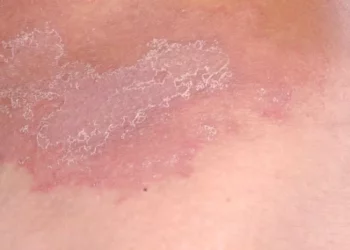Ringworm, despite its name, is not caused by a worm but rather a fungal infection that can affect the skin, scalp, and even nails. This common condition, caused by various dermatophyte fungi, typically results in circular, red, itchy patches on the skin. While the symptoms of ringworm are primarily associated with the skin, there are questions about whether this infection can cause more systemic effects, potentially affecting the gastrointestinal system and causing stomach-related symptoms.
Understanding Ringworm
Before delving into the potential connections between ringworm and gastrointestinal symptoms, it’s important to grasp the basics of this fungal infection. Ringworm is caused by different species of fungi known as dermatophytes, including Trichophyton, Microsporum, and Epidermophyton. These fungi thrive on keratin, a protein found in the skin, hair, and nails of humans and animals. The infection is highly contagious and can spread through direct contact with infected individuals, animals, or contaminated objects like towels, clothing, and combs.
Ringworm manifests as circular, scaly, and inflamed patches on the skin, which may be itchy and uncomfortable. The most common areas affected include the scalp, feet (athlete’s foot), groin (jock itch), and body (ringworm or tinea corporis). In severe cases or if left untreated, ringworm can lead to complications such as secondary bacterial infections or a more widespread fungal infection.
Symptoms of Ringworm
The symptoms of ringworm primarily involve the skin and can vary depending on the location and severity of the infection. Common signs and symptoms of ringworm include:
- Red, scaly patches: These are often circular and may have defined edges.
- Itching and discomfort: The affected skin may be itchy, and scratching can exacerbate the condition.
- Blisters or oozing lesions: In some cases, particularly with more severe infections, blisters or oozing may occur.
- Hair loss: When ringworm affects the scalp (tinea capitis), it can lead to hair loss or breakage.
- Brittle or thickened nails: Nail ringworm (tinea unguium) can cause changes in nail texture and appearance.
Most cases of ringworm can be diagnosed based on clinical appearance. In some instances, a skin scraping or culture may be performed to confirm the diagnosis, especially if the infection is not responding to treatment.
Ringworm and Gastrointestinal Symptoms
The question of whether ringworm can cause stomach-related symptoms like nausea or stomach upset is less straightforward. Ringworm primarily affects the skin and does not typically invade deeper tissues or organs in the body. Therefore, the direct correlation between ringworm and gastrointestinal symptoms is considered unlikely.
However, there are indirect ways in which ringworm might lead to stomach-related issues:
1. Systemic Antifungal Treatment: In severe cases of ringworm or when the infection is widespread, oral antifungal medications may be prescribed. These medications can have side effects, including gastrointestinal symptoms like nausea, vomiting, or diarrhea.
2. Secondary Infections: If ringworm leads to open sores or blisters on the skin due to scratching, there is a risk of secondary bacterial infections. These infections, if systemic, can cause symptoms such as fever, malaise, or gastrointestinal upset.
3. Psychological Impact: Severe cases of ringworm, particularly those affecting highly visible areas like the face or scalp, can cause significant emotional distress and anxiety. Stress and anxiety are known to manifest as physical symptoms, including gastrointestinal disturbances.
Treatment and Management
The treatment of ringworm is primarily aimed at eliminating the fungal infection and relieving symptoms. Depending on the location and severity of the infection, treatment options may include:
1. Topical antifungal creams: Over-the-counter or prescription-strength creams and ointments are effective for most cases of ringworm.
2. Oral antifungal medications: In severe or widespread cases, oral medications may be prescribed.
3. Antifungal shampoos: For scalp infections, medicated shampoos containing antifungal agents may be recommended.
4. Good hygiene practices: Keeping the affected area clean and dry can help prevent the spread of infection and promote healing.
It’s important to follow the prescribed treatment regimen and complete the full course of medication, even if symptoms improve, to prevent recurrence of the infection.
Conclusion
In conclusion, while ringworm primarily affects the skin and does not directly cause gastrointestinal symptoms, there are potential indirect links between the two. The most common gastrointestinal symptoms associated with ringworm are side effects of systemic antifungal medications or secondary bacterial infections due to skin breakdown. Additionally, the psychological impact of ringworm can lead to stress-related symptoms, including gastrointestinal upset.
If you suspect you have ringworm or are experiencing unusual gastrointestinal symptoms alongside a skin rash, it’s essential to consult a healthcare professional for proper evaluation and management. Early diagnosis and treatment can help alleviate symptoms and prevent complications associated with ringworm and its potential effects on overall well-being.
Related Topics:


























